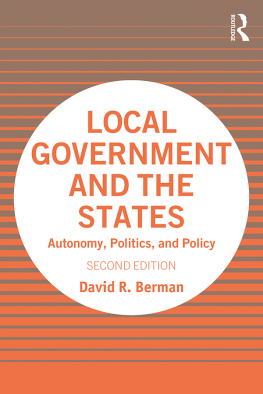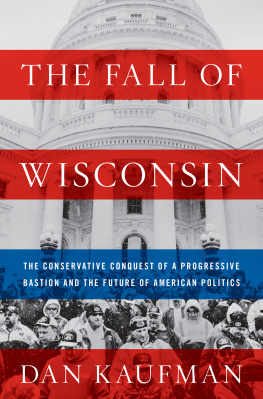2019 by University Press of Colorado
Published by University Press of Colorado
245 Century Circle, Suite 202
Louisville, Colorado 80027
All rights reserved

The University Press of Colorado is a proud member ofthe Association of University Presses.
The University Press of Colorado is a cooperative publishing enterprise supported, in part, by Adams State University, Colorado State University, Fort Lewis College, Metropolitan State University of Denver, University of Colorado, University of Northern Colorado, Utah State University, and Western State Colorado University.
ISBN: 978-1-60732-915-2 (cloth)
ISBN: 978-1-60732-916-9 (ebook)
DOI: https://doi.org/10.5876/9781607329169
Library of Congress Cataloging-in-Publication Data
Names: Berman, David R., author.
Title: Governors and the Progressive movement / by David R. Berman.
Description: Louisville, Colorado : University Press Of Colorado, [2018] | Includes bibliographical references and index.
Identifiers: LCCN 2019005808| ISBN 9781607329152 (cloth) | ISBN 9781607329169 (ebook)
Subjects: LCSH: GovernorsUnited StatesStatesHistory. | Progressivism (United States politics)History. | PopulismUnited StatesStatesHistory. | Progressive Party (U.S. : 1912) | Populist Party (U.S. : 1892-1908)
Classification: LCC JK2447 .B45 2018 | DDC 973.91092/2dc23
LC record available at https://lccn.loc.gov/2019005808
Cover photographs, clockwise from top left: Oswald West, Stephen Hogg, Robert La Follette, Joseph Folk, Hiram Johnson, Theodore Roosevelt, Woodrow Wilson, Charles Evan Hughes. All images courtesy of the Library of Congress.
Americas Age of Reform, roughly from 1890 to 1920, was one in which reform-minded politicians, spurred on by scores of crusading organizations and individuals, set out to accomplish a wide variety of goals. This book focuses on one set of actors who played a crucial role in the development of the movement for reform and the enactment or failure of many policy proposals: the governors of the various states.
The idea for this book grew out of some of my own research, especially a study I did on Governor Hunt of Arizona, published in 2015, which raised several questions in my mind about the behavior, role, and accomplishments of governors in regard to the unfolding of reform during the Populist-Progressive reform era (I think of the Populist and Progressive movements in many ways as constituting one continuous movement). I decided to find out more about what other governors were doing in the same period. This was one of those projects that took on a life of its own. It kept growing as I continued to find more governors I wanted to know more about.
I sought information on their personal histories, political careers, personalities, leadership qualities, governing styles, orientation toward reform, reform packages they put together, role in regard to the drive for Progressive reform in their states, and accomplishments as reformers along with a general account of the conditions under which they served. I paid attention to their stands on a broad range of issues, including those involving corporate regulation and taxation, labor protection, participation in the political process, governmental organization, moral uplift, the criminal justice system, education, transportation, and public health. I looked into their performance not simply in terms of legislation but as chief administrators in charge of the prison system and other state institutions, as commanders in chief of the state militia or National Guard in their handling of labor disputes, riots, and lynching and as chief magistrates issuing pardons and commutations. I paid particular attention to how racism played into the Progressive movement and the decisions governors had to make. I found many governors worthy of praise, but did not ignore their limitations and imperfections. Some were very disagreeable people.
Preparation of this manuscript involved analyzing letters, speeches, and documents gathered from archives around the country and examining and integrating many secondary studies. I drew upon several well-known newspapers and a host of relatively rare and unexplored ones owned and operated by people in small towns and rural areas and ones written by and for minority group members, labor activists, and those on both the far right and far left. Many of these papers were found online through the Library of Congress. In exploring the secondary literature I looked for informed biographies of individual governors and, in shaping the context for understanding and attempting to explain their activities, I drew upon the insights of scholars from various academic disciplines. In particular this work draws upon scholarship in the fields of history, political science, and public policy and aims to contribute to the literature in each of these areas.
After an initial review of gubernatorial activity in each of the forty-eight states in existence at the time, I proceeded to put together an overview of which governors were doing what in regard to reform in each state, using a regional framework. More attention is paid to some governors than others in the following pages. Ive highlighted those who, based on the information I was able to gather, struck me as particularly significant in terms of ideas, experiences, or accomplishments. I have given special attention to governors who stood out because of their reputations as Progressives in the eyes of respected historians and contemporary observers, supplemented by what I was able to discover through my own examination of primary materials. Much of the focus is on the highly proactive types who assumed leadership and challenged entrenched political party and economic leaders in an effort to bring about a package of fundamental political, economic, and social changes.
There were assertive reform-minded governors in the 1890s and before, but the early 1900s brought the emergence of a larger set of strong governors who exerted considerable influence over their political parties and the legislatures in their states. Though it has been common to think of only a few exceptional figures such as Robert La Follette of Wisconsin, Hiram Johnson of California, and Woodrow Wilson of New Jersey as falling into this category, examination of the evidence during this period suggests that many governors around the nation assumed leadership positions and pushed through significant reforms. Much of what happened in Wisconsin, California, and New Jersey also happened elsewhere around the country.
These new governors with a Progressive bent played a special role in bringing change. Citizen reformers, academics, and journalistic muckrakers were outsiders looking in, but the governors, while cognizant of outside forces, were exceptionally pivotal insiders. Outsiders could stand as unflinching and unbending proponents of their causes and were expected to do so, but governors operated in a more restrictive environment, being hemmed in by concerns with electoral pressures on them or their political party and with practical problems of political and economic feasibility when it came to pursuing various courses of action. Sitting at the hub of reform activity, they sorted out the demands of various groups, compiled their own reform packages, submitted them to their legislatures, and worked for their adoption.






 The University Press of Colorado is a proud member ofthe Association of University Presses.
The University Press of Colorado is a proud member ofthe Association of University Presses.